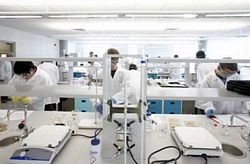CHEMICAL ANALYSISPVA has national-class infrastructure to support the science and technology activities for the industry. Our testing facility and associates perform many multi-disciplined analytical chemistry testing utilizing state-of-the-art instrumentation. Our chemical engineering department is headed by Dr. Gene S. Hall, Ph.D. Our team and associates are trained and use such equipment as a Fisons instrument plasmaQuad 2+ ICPMS, a Finnigan element high resolution ICPMS and a Gradient HPLC system. This equipment allows for the analytical approach to biological, statistical, environmental and analytical chemistry. One of our chemical departments deals with organic chemistry which is the chemistry of compounds of carbon. Our services involve the following test procedures:

- Atomic absorption spectroscope
- proton-induced X-ray emission (PIXE)
- Fabric flammability testing
- Chemical biology
- Biometric chemistry
- Nano-materials science and technology
- Industrial flow modeling
- Chemical engineering science
Specifically to the industry we also perform fire debris sampling, collection and testing. Fire scene samples in accordance with the National Fire Protection Association (NFPA) 921 which involve ASTM and practice E 1412-07, and analyze according to ASTM standard method E 1618-10. Gas chromatogramphic/mass spectrometric (GC/MS) is performed when analyzed for concentrated head space vapors. The testing will reveal the characteristics of potential combustible or flammable liquids that may have been involved in fire scene investigations.
We also have the capability of performing XRF spectrometry which determines the elemental fingerprint composition of particulates to identify their source within structures. Many times discoloration, residue or even puff back claims involving heating systems can positively be identified through these tests for verification of the type of residue that exists. This testing also allows testing of wetted materials to determine if contents of water damage from ground water/tap water or any other source of fluid. These tests help distinguish the type of water damage and verification of these damages to a subject structure.
Furthermore our chemical laboratory is able to perform spectrochemical analysis of automobile and mechanical fluids such as transmission and engine oil fluids. The elemental breakouts when testing in PPM (parts/million) will document where metals associated with mechanical use of equipment other oils such as lubricant and hydraulic can also be analyzed for deficiencies and its overall integrity and viscosity. Other specialized chemical analyses can be performed upon your request evaluation of manufacturing equipment and processing of materials and organics can also be evaluated for purposes of assisting you in your investigation or claim.













